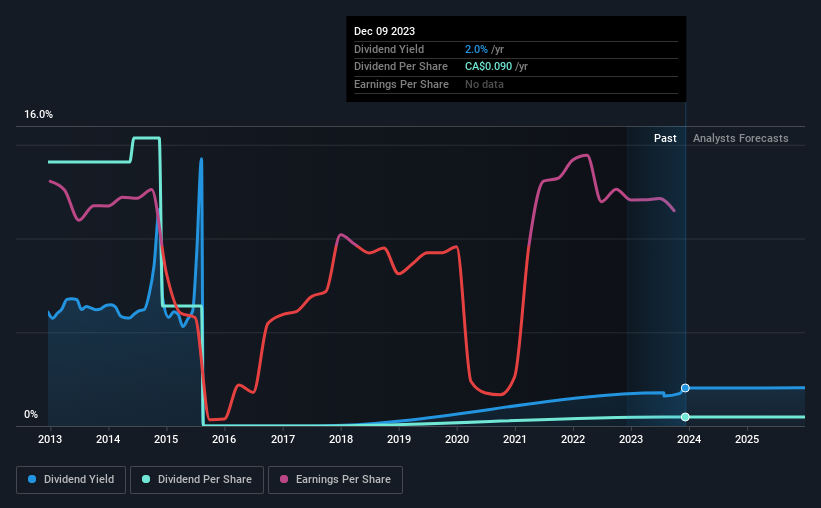Baytex Energy (TSE:BTE) Could Be A Buy For Its Upcoming Dividend
Baytex Energy Corp. (TSE:BTE) is about to trade ex-dividend in the next 4 days. The ex-dividend date occurs one day before the record date which is the day on which shareholders need to be on the company's books in order to receive a dividend. The ex-dividend date is an important date to be aware of as any purchase of the stock made on or after this date might mean a late settlement that doesn't show on the record date. Thus, you can purchase Baytex Energy's shares before the 14th of December in order to receive the dividend, which the company will pay on the 2nd of January.
The company's upcoming dividend is CA$0.022 a share, following on from the last 12 months, when the company distributed a total of CA$0.09 per share to shareholders. Last year's total dividend payments show that Baytex Energy has a trailing yield of 2.0% on the current share price of CA$4.44. We love seeing companies pay a dividend, but it's also important to be sure that laying the golden eggs isn't going to kill our golden goose! So we need to investigate whether Baytex Energy can afford its dividend, and if the dividend could grow.
View our latest analysis for Baytex Energy
Dividends are typically paid from company earnings. If a company pays more in dividends than it earned in profit, then the dividend could be unsustainable. Baytex Energy paid out just 1.9% of its profit last year, which we think is conservatively low and leaves plenty of margin for unexpected circumstances. Yet cash flow is typically more important than profit for assessing dividend sustainability, so we should always check if the company generated enough cash to afford its dividend. Baytex Energy paid a dividend despite reporting negative free cash flow over the last twelve months. This may be due to heavy investment in the business, but this is still suboptimal from a dividend sustainability perspective.
Click here to see the company's payout ratio, plus analyst estimates of its future dividends.
Have Earnings And Dividends Been Growing?
Companies with consistently growing earnings per share generally make the best dividend stocks, as they usually find it easier to grow dividends per share. If business enters a downturn and the dividend is cut, the company could see its value fall precipitously. Fortunately for readers, Baytex Energy's earnings per share have been growing at 19% a year for the past five years.
The main way most investors will assess a company's dividend prospects is by checking the historical rate of dividend growth. Baytex Energy has seen its dividend decline 29% per annum on average over the past 10 years, which is not great to see. It's unusual to see earnings per share increasing at the same time as dividends per share have been in decline. We'd hope it's because the company is reinvesting heavily in its business, but it could also suggest business is lumpy.
Final Takeaway
Is Baytex Energy worth buying for its dividend? We like that Baytex Energy has been successfully growing its earnings per share at a nice rate and reinvesting most of its profits in the business. However, we note the high cashflow payout ratio with some concern. Overall, it's not a bad combination, but we feel that there are likely more attractive dividend prospects out there.
In light of that, while Baytex Energy has an appealing dividend, it's worth knowing the risks involved with this stock. For example, Baytex Energy has 6 warning signs (and 3 which are a bit unpleasant) we think you should know about.
Generally, we wouldn't recommend just buying the first dividend stock you see. Here's a curated list of interesting stocks that are strong dividend payers.
Have feedback on this article? Concerned about the content? Get in touch with us directly. Alternatively, email editorial-team (at) simplywallst.com.
This article by Simply Wall St is general in nature. We provide commentary based on historical data and analyst forecasts only using an unbiased methodology and our articles are not intended to be financial advice. It does not constitute a recommendation to buy or sell any stock, and does not take account of your objectives, or your financial situation. We aim to bring you long-term focused analysis driven by fundamental data. Note that our analysis may not factor in the latest price-sensitive company announcements or qualitative material. Simply Wall St has no position in any stocks mentioned.

